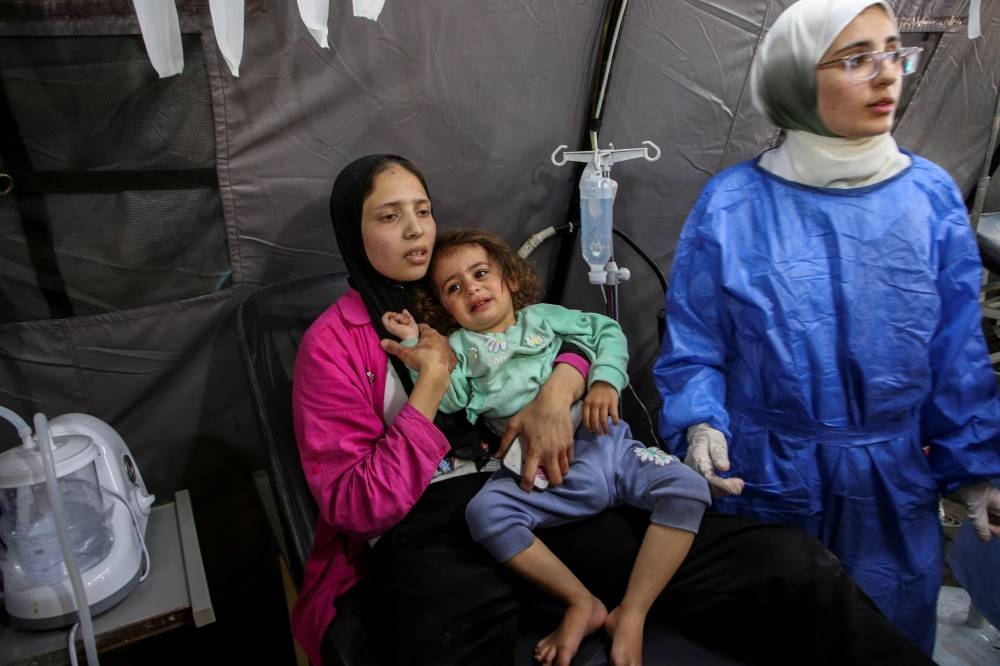Israeli forces seized the main border crossing between Egypt and southern Gaza on Tuesday, shutting down a vital aid route into the Palestinian enclave that is already on the brink of famine.
Hamas accused Israel of trying to undermine efforts to secure a ceasefire in the seven-month-long war that has laid waste to Gaza and left hundreds of thousands of its people homeless and hungry.
Israeli army footage showed tanks rolling through the Rafah crossing complex and the Israeli flag raised on the Gaza side.
Israeli Prime Minister Benjamin Netanyahu said seizing the crossing was a "very significant step" towards its stated aim of destroying Hamas's military capabilities.
UN and other international aid agencies said the closing of the two crossings into southern Gaza — Rafah and Israeli-controlled Kerem Shalom — had virtually cut the enclave off from outside aid and very few stores were available inside.
Red Crescent sources in Egypt said shipments had completely halted.
"The Israeli occupation has sentenced the residents of the Strip to death," said Hisham Edwan, spokesperson for the Gaza Border Crossing Authority.
As well as a key entry point for aid, the crossing was the only exit point for those needing to leave Gaza for medical treatment that is no longer available in the enclave.
Lama Abu Holi, 8, has been in Al-Aqsa hospital for a month, waiting for a chance to leave for treatment to her injured legs.
"Today my name was at the border, and I should travel to get my legs treated," she said, holding a toy in her hospital bed. "They hurt. I am supposed to have an operation. Because the border crossing is shut today, I could not travel. I am sad because I did not leave today."
The seizure of the Rafah crossing came despite weeks of calls from the US, other countries and international bodies for Israel to hold off from a big offensive in the Rafah area — the refuge of more than one million displaced Palestinian civilians.
Many of the people now in Rafah are struggling to find a safe place to go in the tiny strip of land which has been bombarded almost non-stop since October 7.
Families have been crammed into tented camps and makeshift shelters, suffering from shortages of food, water, medicine and other essentials.
Residents yesterday evening reported heavier tank shelling in some areas of eastern Rafah after air and tank strikes overnight Monday and yesterday. The Gaza health ministry said Israeli strikes across the enclave had killed 54 Palestinians and wounded 96 others in the past 24 hours.
Israel's military said it has told civilians to go to what it calls an "expanded humanitarian zone" some 20km away.
Patients started to leave Abu Youssef Al-Najar hospital in east of Rafah after residents and some inside the hospital received phone calls telling them to evacuate areas designated by the Israeli army as a combat zone, medics and residents said.
In Geneva, UN humanitarian office spokesperson Jens Laerke said "panic and despair" were gripping the people in Rafah.
He said that under international law people must have adequate time to prepare for an evacuation, and have a safe route to a safe area with access to aid. This was not the case in the Rafah evacuation, he said.
"It's littered with unexploded ordnance, massive bombs lying in the street. It's not safe," he said.
A total of 34,789 Palestinians, most of them civilians, have been now killed by Israel, the Gaza Health Ministry said.
UN Secretary-General Antonio Guterres appealed to Israel and Hamas to spare no effort to get a truce deal and urged Israel to reopen the border crossings immediately, saying Gaza risks running out of fuel this evening.
"Make no mistake — a full-scale assault on Rafah would be a human catastrophe."

A Palestinian woman holds a girl wounded in an Israeli strike, at a hospital as Israeli forces launch a ground and air operation in the eastern part of Rafah in the southern Gaza Strip on Tuesday. (Reuters)
